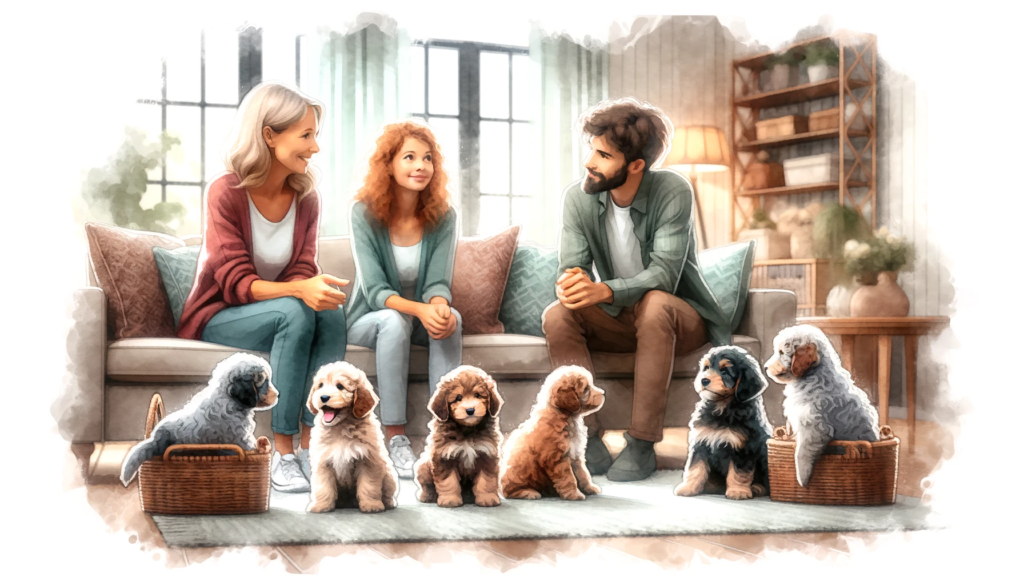Finding a responsible, ethical breeder is an essential step in the journey of bringing an Aussiedoodle into your home if you are going the route of breeders. As Aussiedoodles have become increasingly popular, backyard breeders and puppy mills which prioritize profit over the well-being of the dogs have become more common.
When you choose a responsible breeder, you are not only ensuring that your future pet is healthy and well-socialized, but you are also supporting ethical breeding practices that prioritize the welfare of the animals. Responsible breeders conduct genetic health testing, provide a nurturing environment for their puppies, and are deeply committed to the physical and emotional well-being of both the puppies and their parent dogs. They are knowledgeable about this crossbreed and willing to provide lifetime support to new owners.
On the other hand, backyard breeders, dog brokers, pet stores, and puppy mills often neglect these important aspects. They may not conduct necessary health screenings, leading to puppies with preventable genetic diseases. The lack of proper early socialization and care in these environments can result in behavioral and health issues in the dogs–and supporting this contributes to the cycle of irresponsible breeding and animal mistreatment.
Additionally, online scams are a growing problem with the BBB reporting that 35% of all online scam reports they receive are for puppies. People are scammed out of their money and never receive a dog–or receive a dog different than the one they ordered.
Therefore, it is crucial to thoroughly research and identify breeders who demonstrate ethical breeding practices. This guide aims to equip you with the knowledge and tools to find a responsible Aussiedoodle breeder, ensuring a happy, healthy, and ethically-sourced addition to your family.

Genetic Testing
Responsible breeding of Aussiedoodles involves conducting genetic tests to ensure the health and well-being of the puppies. This is important because, like all breeds, both Australian Shepherds and Poodles have specific genetic predispositions to certain health conditions.
Look for an indication that breeders have done genetic testing on the parent dogs. Some breeders will post links to the test results. Commonly used DNA tests include Embark, Paw Print Genetics and Animal Genetics.
Here are some of the key genetic tests that should be considered:
Hip Dysplasia Testing: This is crucial for both Australian Shepherds and Poodles. Hip dysplasia is a common genetic condition that can lead to arthritis and mobility issues.
Elbow Dysplasia Testing: Similar to hip dysplasia, elbow dysplasia is a concern, particularly in larger breeds and mixes.
Eye Health Testing: Both breeds are prone to certain eye conditions, such as cataracts and progressive retinal atrophy. Regular eye exams by a certified veterinary ophthalmologist are recommended.
von Willebrand’s Disease Testing: This is a blood clotting disorder that is found in both parent breeds. Testing for von Willebrand’s disease is important to prevent breeding carriers or affected dogs.
Hereditary Cataracts (HC): Australian Shepherds can carry genes for hereditary cataracts. Testing for this condition is important.
Collie Eye Anomaly (CEA): This is a condition that Australian Shepherds can be prone to; it affects the choroid layer of the eye.
Multidrug Resistance 1 (MDR1) Gene Testing: Australian Shepherds and some other herding breeds can have a mutation in the MDR1 gene, leading to sensitivity to certain drugs. This is very common in Aussies so Aussiedoodles are at risk. (Our Aussiedoodle Isla has one copy of this mutation so I’m extra aware to remind our veterinarian before any medication is given.)
Neonatal Encephalopathy with Seizures (NEWS) in Poodles: This is a brain condition affecting Poodles and should be tested for.
Degenerative Myelopathy (DM) Testing: Both parent breeds can be carriers of the gene that causes DM, a progressive spinal cord disorder.
Exercise-Induced Collapse (EIC) Testing: Particularly relevant in some lines of Australian Shepherds.
Sebaceous Adenitis (SA) Testing: A skin disease found in some Poodles.
Addison’s Disease Testing: Standard Poodles are prone to Addison’s disease, an endocrine disorder.
Since Aussiedoodles are a mixed breed, the relevance of each test can vary depending on the specific lineage of the individual dog.
Responsible breeders will conduct these tests on the parent dogs before breeding and will share the results with potential buyers. It’s important for prospective owners to ask breeders about the health testing they’ve performed and to see documentation of the results.
More Signs of Responsible Breeders
Don’t be swayed by an attractive website and one that ranks well in search results. You’ll need to do your homework to find a good breeder, preferably one in your area.
Here are more key factors to consider when looking for a responsible Aussiedoodle breeder:
Reputation and Reviews: Start by looking for breeders with positive reviews and good reputations. You can find reviews on breeder websites, social media, or dog forums. Don’t hesitate to ask for references from previous buyers. If you know other Aussiedoodle owners in your area, ask for their recommendations as well.
Health Testing and Veterinary Care: Along with the genetic tests mentioned above, responsible breeder should provide clear records of veterinary care, vaccinations, and deworming.
Knowledgeable About the Breed: Good breeders have extensive knowledge about Aussiedoodles, including their temperament, health issues, and care needs. They can also answer questions about the personality of the parent dogs. They should be able to answer all your questions about Aussiedoodles.
Transparent Practices: Visit the breeder’s facility if possible. A responsible breeder will be open to showing you where the dogs are kept, how they are raised, and the condition of the parent dogs. Some breeders will understandably not allow visitors while puppies are young due to health risks but you should be able to see the puppies on video–and should be encouraged to come pick up the puppy at the breeder’s facility on adoption day. If the breeder insists on meeting in a parking lot somewhere, look elsewhere.
Socialization and Early Care: Puppies should be raised in a clean, safe, and stimulating environment and should have begun socialization with humans and other dogs.
Scarcity: Be wary of breeders who always have puppies available, offer multiple breeds, or sell through pet stores. These can be signs of a puppy mill, which often prioritizes profit over the welfare of the dogs.
Fair and Detailed Contracts: Look for breeders who provide a comprehensive contract that includes health guarantees, return policies, and spay/neuter agreements. We’ve got more information on what to expect from a puppy contract below.
After-Sale Support: A responsible breeder will offer support after you take your puppy home and be available to answer questions about care, training, and health.
Spay/Neuter Policies: Some breeders require that pets be spayed or neutered to prevent unplanned breeding and overpopulation.
Waiting Lists: Responsible breeders often have waiting lists for their puppies, indicating they don’t breed their dogs excessively and take care in finding suitable homes.
Interview or Application Process: Be prepared for the breeder to ask you questions–lots of questions including questions about your lifestyle and schedule, your other pets, your veterinarian, your experience with herding breeds and much more. A responsible breeder will want to ensure their puppies are going to good homes.
Lifetime Commitment: Look for breeders who commit to taking back dogs at any point in their lives if you are unable to care for them.
By following these guidelines, prospective pet owners can increase their chances of finding a responsible Aussiedoodle breeder who prioritizes the health and well-being of their dogs.
Look for a Contract
You should expect to receive a contract that outlines various terms and conditions. This contract serves to protect the interests of the breeder, the buyer, and most importantly, the welfare of the dog. Here’s a look at an Aussiedoodle puppy agreement.
Look for these key elements typically included in a contract from a responsible dog breeder:
- Health Guarantees: Breeders often provide a health guarantee that covers genetic disorders or diseases for a specified period. This may include a vet check-up guarantee within a few days of purchase.
- Vaccination and Medical Records: The contract should detail the dog’s vaccination records and any medical treatments it has received.
- Spay/Neuter Agreement: Many breeders require that pets be spayed or neutered to prevent unplanned breeding. There may be a clause specifying the age by which this should be done.
- Return Policy: A clause specifying the breeder’s policy if the buyer is unable to keep the dog. Ethical breeders often require that the dog be returned to them in such cases.
- Breed-Specific Information: Information about the specific needs, temperament, and care requirements for Aussiedoodles.
- Registration Papers: If the dog is of a registered breed, the contract may include details about obtaining pedigree papers.
- Non-Breeding Clause: There might be a clause preventing the buyer from breeding the dog and requiring spay/neuter. If you are interested in breeding, reputable breeders will want to know more about your breeding program.
- Microchipping and Identification: Details about the dog’s microchip and the requirement to transfer ownership details to the buyer.
- Feeding and Care Instructions: Guidelines for proper care, diet, and exercise of the dog.
- Liability Clauses: These may outline the breeder’s and the new owner’s responsibilities and liabilities.
- Payment Terms: Details about the purchase price, deposit requirements, and refund policies.
- Outlining Deposit Requirements: A deposit typically reserves a specific puppy or a spot in a litter for the buyer. In some cases, it might be for a future litter if the current litter is already spoken for. The deposit is usually a part of the total purchase price, not an additional fee. It’s deducted from the total cost of the puppy. Deposits are often non-refundable, especially if the buyer decides not to purchase the puppy. However, the terms can vary, and some breeders may offer refundable deposits under certain conditions, like if specific health issues arise in the puppy.
- Future Contact: Some breeders include a clause requiring periodic updates on the dog’s health and wellbeing.
It’s crucial for buyers to thoroughly read and understand the contract before signing. If there are any points of concern or unclear terms, it’s advisable to discuss these with the breeder or seek legal advice. Remember, a well-drafted contract is a sign of a responsible breeder who is committed to the welfare of their dogs.
Pin it to remember

- What’s an Unfurnished Aussiedoodle? - December 14, 2024
- 500+ Aussiedoodle Names - July 29, 2024
- Does Your Breeder Do Puppy Socialization? - July 9, 2024
